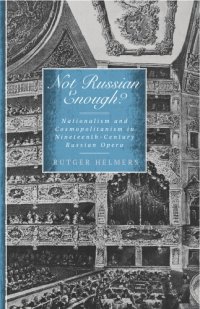It is often believed that the "Russianness" of Russian music is what makes it special. This conviction has its origins in the nineteenth century, when Russian composers and critics were encouraged to cultivate a recognizable national style and distinguish their music from the dominant Italian, French, and German traditions. A focus on nationalism, however, fails to capture the complex realities of nineteenth-century musical life, in which the desire to develop a national style always had to compete with other interests, principles, and tastes. This book explores the many tensions, contradictions, and misunderstandings that arose when the aspiration for a national tradition was applied to the cosmopolitan world of opera. It discusses such issues as the influence of Italian and French opera, the use of foreign subjects, the application of local color, and the adherence to the classics, and considers their implications for the perception of "Russianness." Helmers analyzes the cultural context, music, and reception of four operas: Glinka's A Life for the Tsar (1836), Serov's Judith (1863), Tchaikovsky's The Maid of Orléans (1881), and Rimsky-Korsakov's The Tsar's Bride (1899). Besides yielding new insights for each of these works, this study offers a fresh perspective on the function of nationalist thought in the nineteenth-century Russian opera world. Rutger Helmers is Assistant Professor in Historical Musicology at the University of Amsterdam and lectures in Literary and Cultural Studies at Radboud University Nijmegen. Read more...
